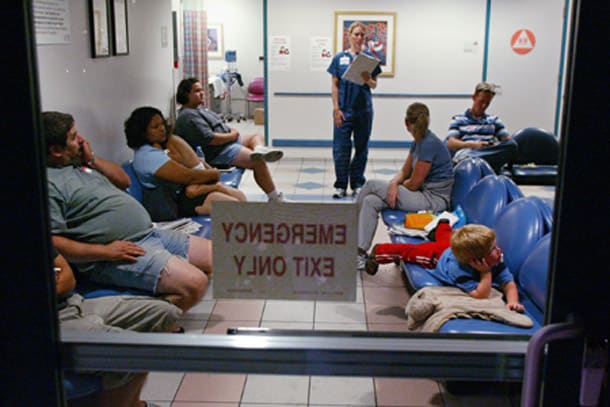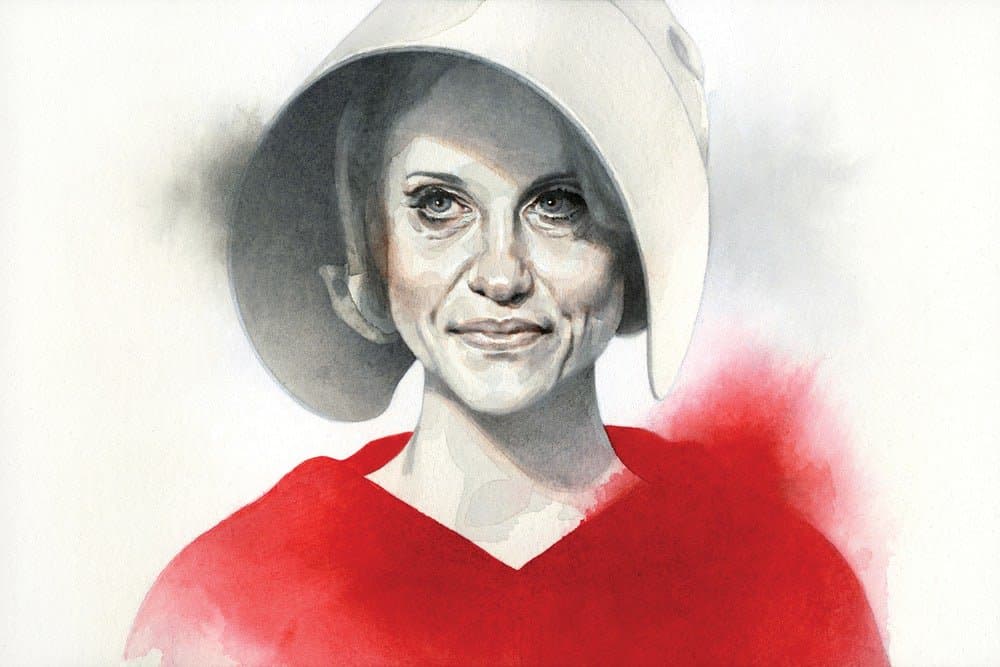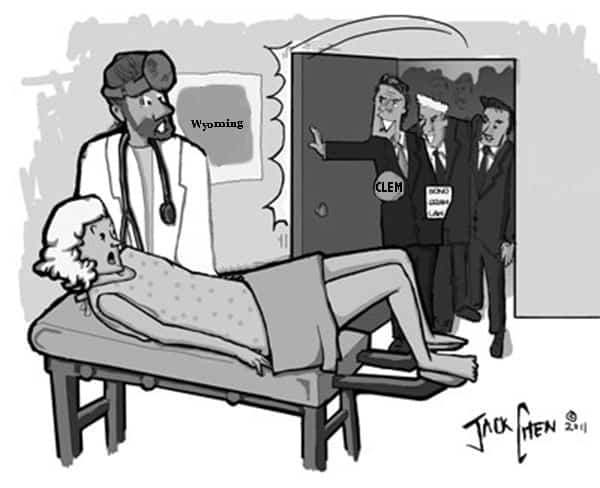Bills to expand Medicaid and raise the minimum wage die in the House
The Wyoming House killed two bills Monday night that is has often considered and just as often defeated: Medicaid expansion and a minimum wage increase.
In typical callous fashion on these issues—which both failed by 23 – 36 votes—the majority ignored the facts and relied instead on tired, misinformed rhetoric to once again win the day.
Work requirements
House Bill 244 would have expanded Medicaid to an estimated 27,000 childless, low-income residents who are among the 80,000 Wyoming residents who do not have health insurance.
The bill’s sponsor, Rep. Andy Schwartz (D-Jackson), included work requirements in this year’s bill—a new provision meant to persuade far-right lawmakers who think anyone who receives public services must be a “freeloader.” The requirements would have been negotiated between the Wyoming Department of Health and the U.S. Department of Health and Human Services, with the consent of the governor.
Schwartz said seven states have now obtained waivers from the federal government to add work requirements to Medicaid expansion, which typically require 20 hours per week of some combination of work, job training, education, or volunteering.
Conservative opponents of Medicaid expansion in Wyoming have been howling since 2013 for work requirements. The bill’s failure this session shows just how disingenuous those calls have been all along.
Screw the hospitals and the people they treat
Schwartz explained Monday that HB-244 had the support of Wyoming hospitals, physicians, and the only health insurer that provides policies through the federal Health Marketplace, Blue Cross Blue Shield of Wyoming. In fact, a BCBS lobbyist testified last week that Medicaid expansion was “the only tool left” for the state to see lower insurance premiums for everyone.
Medicaid expansion was “the only tool left” for the state to see lower insurance premiums.
Wyoming now ranks 46th in the nation in the cost of health care and 49th in the cost of health insurance, Schwartz said. It is the only state in the nation whose uninsured population is growing.
The bill had an opt-out clause that stated if the federal government ever pays for less than 90 percent of the cost of Medicaid expansion or the courts declare it unconstitutional, Wyoming could just end the program.
Nevertheless, fear mongering won the day.
“It’s going to bankrupt Wyoming,” charged Rep. Clarence Styvar (R-Cheyenne), without offering any evidence.
In fact, Schwartz explained that Medicaid expansion would help significantly reduce the $130 million in annual uncompensated costs incurred by Wyoming hospitals who must provide expensive emergency room healthcare to poor people who can’t afford to pay.
The Wyoming way?
The final card Schwartz played was one that Medicaid expansion opponents would have jumped on if they really believed they want a “Wyoming solution” to the high cost of healthcare in the state.
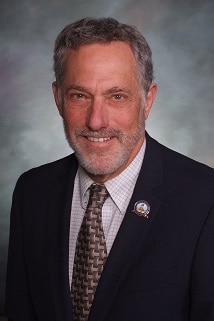
Rep. Andy Schwartz
Schwartz pointed out that three of Wyoming’s neighbors—Idaho, Nebraska and Utah—all passed Medicaid expansion in November via ballot initiative, with help from out-of-state organizations.
He said he could foresee outside groups making a similar ballot initiative attempt in Wyoming in 2020 and asked if the Legislature would rather carefully craft its own bill or rely on the wording on a ballot initiative that wouldn’t contain what legislators want to see in an expanded Medicaid program.
Their choice was a clear signal to voters that they’ll have the address the issue themselves if they ever want Wyoming to join the 36 states and the District of Columbia that have expanded Medicaid.
Minimum wage stays low
Meanwhile, House Bill 273 would have raised Wyoming’s state minimum wage from $5.15 an hour to $8.50.
Another “deal sweetening” provision was included in this bill by the House Labor, Health, and Social Services Committee last week. When it agreed to pass the bill, the committee removed a section that would have increased the wage an additional 25 cents per year until it reached $9.75 in 2024.
But that wasn’t sweet enough for the House. On Monday, its members voted to amend the bill so that it would only raise the minimum wage to $7.25, which is currently the federal minimum.
Then they voted to kill the whole bill, just like they have every similar measure for the past six years.
No one makes minimum wage in Wyoming
Rep. Cathy Connolly (D-Laramie), the bill’s sponsor, said an estimated 2,000 workers make the federal minimum wage and another 2,000 make below that amount. These low-income employees “face a tremendous amount of economic insecurity,” Connolly said.
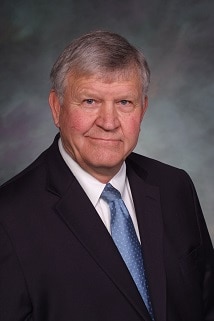
Rep. Lloyd Larsen
But opponents—who offered no proof—said they can’t believe any employers pay their workers so little in Wyoming.
Rep. Lloyd Larsen (R-Lander) said the House might as well make the minimum $20 an hour if they want everyone to make a “dignified wage.”
“Employers will pay you what you’re worth,” said Larsen, who claimed he has some teen employees he’s paid “probably double” the $8.50 proposed state minimum.
If workers “don’t feel they are being justly compensated,” Larsen added, they are free to go work for someone else.
Rep. Scott Clem (R-Gillette) said someone had added up all the hours state lawmakers put in and found they probably make less than the minimum wage. “I guess we’re the suckers, aren’t we?” he joked in his pinstripe suit.
Higher wages or more food stamps?
Connolly said the restaurant and hotel industry, which hires the majority of workers in Wyoming who make the federal minimum wage, did not oppose the increase. In years past, that industry has argued forcefully against minimum wage hikes.
“They too recognize that more money in the economy means more spending in our community,” Connolly said.
“We don’t want to alleviate poverty by increasing reliance on food stamps.”
Connolly tried to play the same “let’s do it our way” gambit that Schwartz did with Medicaid expansion, and got the same result.
She said Congress is now considering a federal minimum wage increase to $10.10 an hour, but it is also considering other ways that improve the lives of low-income workers by either increasing the earned-income tax credit or providing more food stamp assistance through the Supplemental Nutrition Assistance Program.
“We don’t want to think about alleviating poverty—which is on everyone’s mind—by increasing reliance on social services like food stamps,” Connolly said. “That’s not the Wyoming way. We want the dignity of work and so workers can support themselves and their families.”
But most Wyoming House members showed that they don’t care about the dignity of workers, whether they have healthcare or anything else that makes their lives any better at all.

